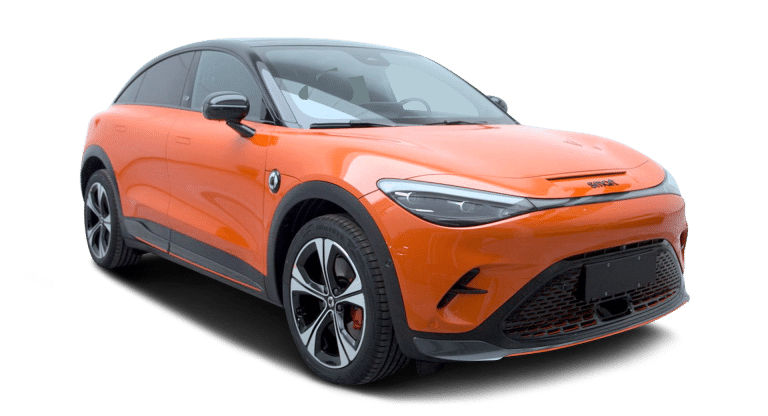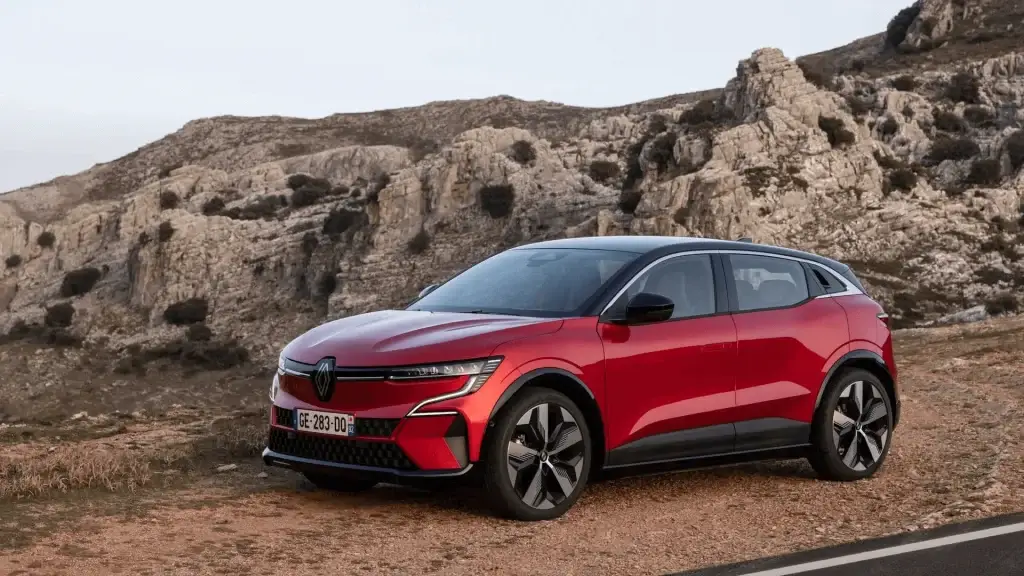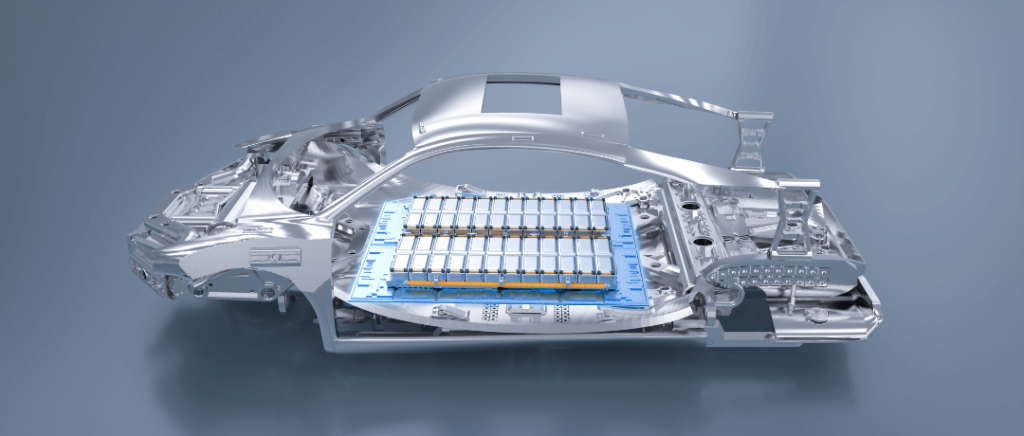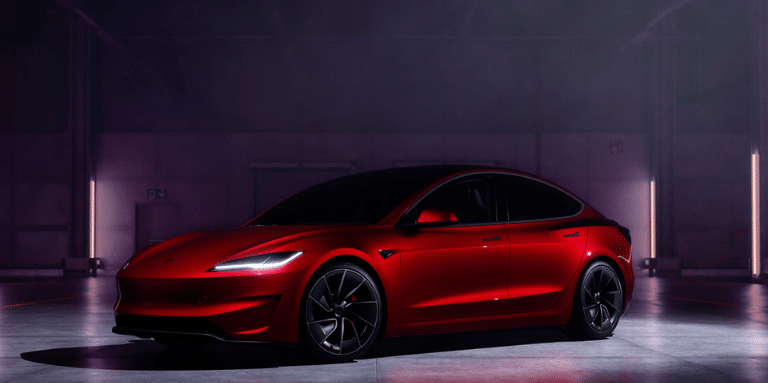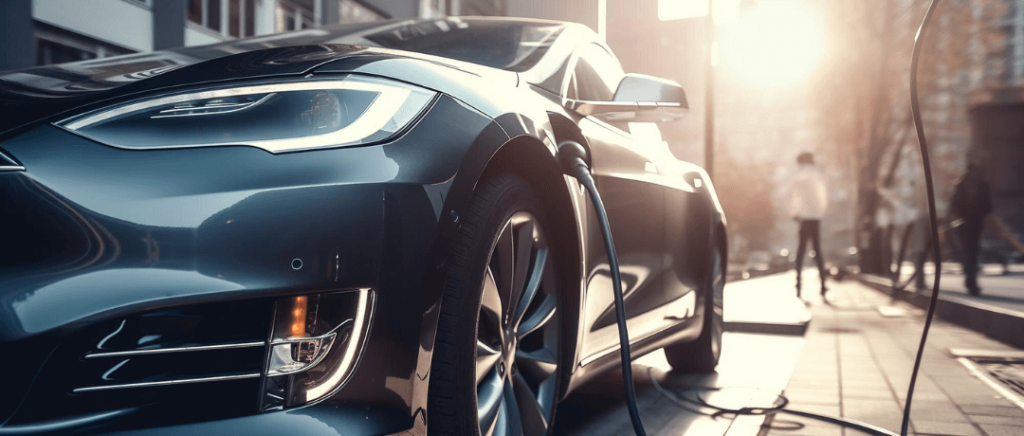Renault Mégane E-Tech test drive: the Renault Mégane changes radically
Forget the previous generation of the Mégane, the E-Tech version has a new look and, at a time when cars are getting bigger and bigger, the Mégane E-Tech is 15 cm smaller than the fourth-generation Mégane. It measures 4.21 meters in length, 1.77 meters in width (excluding mirrors) and 1.51 meters in height. The car is based on the CMF-EV platform, shared with Nissan on its new SUV, the Ariya, and features a host of technical choices, starting with a longer wheelbase that stretches to 2.70 metres to compensate for the few centimetres lost in length.
Looking at the photos, you're probably wondering which segment the Mégane E-Tech. After our test drive, we unfortunately don't know any more than you do, as the brand's representatives place it in the SUV, compact compact and crossover crossovers. Be that as it may, with its shape and dimensions, it does indeed seem to belong more to the crossover segment, even if its slightly receding roof, giving it a rather dynamic appearance, brings it closer to a compact. In any case, the design is quite successful.
A higher-tech, higher-quality interior
Inside, Renault has come up with an excellent surprise. It's a new feature that will no doubt be adopted by the rest of the Renault range, and that's good news for the brand, as it's so successful. The steering wheel is pleasant to hold and groups together all the driving aid controls and those for operating the12.3-inch instrumentation screen right in front of the driver's eyes. To the right of this screen is another 12-inch touchscreen (9 inches on the entry-level "Équilibre" version).
Both screens shine in terms of responsiveness and graphic quality. The old R Link system seems long gone, and the new OpenR Link infotainment system infotainment system has been redesigned, with excellent ergonomics and several physical controls as shortcuts under the screen. Very practical, especially for air conditioning.
A modern car also means a connected car. And the Mégane E-Tech is, since it integrates Google technologies directly into its on-board system, including Google Maps, Google Assistant and the Play Store. Google Maps is the benchmark, guiding its users with precision while keeping an eye on the remainingrange, telling you what percentage of the time you'll arrive at your destination. What if there's not enough battery life? Don't panic, the Mégane is equipped with a trip planner that will guide you to a recharging point. The system is, of course, compatible with Apple CarPlay and Android Auto wirelessly.
As far as connectivity is concerned, the Mégane E-Tech benefits from over-the-air updates and a pairing with theMyRenault application. The app enables you to stay constantly connected to your car and trigger certain functions remotely, such as remote recharging, or ventilation if the car has been parked too long in the sun.
Still on the subject of on-board technology, Renault has thought of integrating an interior rear-view mirror equipped with a small screen. It will be possible to switch to a conventional mirror, but as the rear window is very narrow, the screen is more practical for seeing what's going on. The disadvantage of this kind of technology is the presence of reflections from the sun, sometimes confusing the screen with the mirror.
The screened rearview mirror is part of the "Augmented Vision and Advanced Driving Assist" option package, which also includes blind spot detection, lane keeping assistant, automated parking assistant, 360-degree camera, adaptive cruise control and rear collision warning. This package is available for €1,300 or €1,700, depending on trim level.
And what does this mean in terms of build quality? The Mégane seems to have drawn a line under its sometimes inconsistent interior quality. Materials are of good quality, and the entire upper part of the dashboard is made of soft-touch foam elements. Compared to its main rivals, with the Volkswagen ID.3 at the top of the list, the Mégane does much better.
Test Renault Mégane E-Tech: as welcoming as the previous generation?
The Mégane feels comfortable, but is it welcoming? The answer is yes, especially for a car that's just over 4-meter lengthwhich is still quite compact today. Renault claims a boot capacity of 389 liters (1245 liters with seats folded down), 13 liters less than the Mégane IV.
Note, however, that the announced capacity includes the small hatch under the trunk floor for storing charging cables. And under the hood, too bad, there's no small trunk like on a Tesla Model 3but the electric motor. The technical explanation is simple: the brand has opted for this architecture over a direct The technical explanation is simple: the brand has opted for this architecture rather than direct installation on the rear axle, in order to limit the length of the cables and to be able to imagine a short-circuit cooling system.
And for family travel ? That's possible too, even if the Mégane isn't a true family car. Two adults will fit in the back without too many problems, even if passengers over 1.80 m tall may feel cramped. On the other hand, you don't need to be claustrophobic, as the glass surface is far too thin to let in much light.
A complicated range structure
Hold on to your hats, the Renault Mégane E-Tech range is not simple. It consists of two EV40 and EV60 versions.. They feature battery capacities capacities of 40 and 60 kWh and power ratings of 130 and 220 hp respectively. This also has an impact on battery capacity, and therefore on range. The first version claims a range of 300 kilometers under the WLTP cycle, while the second can climb to 470 kilometers. Customers can also opt for an EV60 version, with the larger battery and smaller 130 hp motor.
When you get to the refill chapter, things get complicated, and that's when you wonder why simplify when you can complicate. The Mégane EV40 entry-level model features an on-board on-board 7 kW charger. A second level, christened "Boost", adds a fast charge of up to 85 kW. That's good, but not crazy either, since most electric cars now exceed 100 kW.
Moving on to the Mégane E-Tech EV60fast charging can be boosted to 135 kW, allowing you to recover 300 kilometers of range in 30 minutes. In our view, this is the most interesting version on paper, all the more so as Renault has integrated a battery pre-heating function to quickly reach recharging power.
What about 22 kW charging? Here again, it's "complicated", since you have to opt for the top-of-the-range version with the "Optimum" option. This type of charging could have been offered as standard, although Renault justifies this by pointing out that few customers use this type of charging, as they mainly recharge at home.
What's it like behind the wheel?
To take on one of, if not the most important most important French novelty of 2022we headed for the hinterland of Malaga, Spain, where the roads are smooth and the terrain sometimes quite rugged. This gave us some interesting initial fuel consumption data.
The ease of use of Mégane E-Tech is appreciably smooth and quiet on board. Renault points out that they have succeeded in reducing noise inside the Mégane by three decibels compared with a Zoé, which is already excellent in this respect. For our test drive, we only had access to the version equipped with the electric motor 220 hp, 300 Nm electric motor and the large 60 kWh battery. Renault claims a 0 to 100 km/h in 7.4 seconds and a top speed limited to 160 km/h (150 km/h for versions with the 130 hp engine).
After a hundred or so kilometers on board, it's hard to find fault with the Mégane E-Tech's road performance. The Mégane E-Tech manages to reconcile the contradictory qualities of comfort and dynamism. The suspension, although not pilot-controlled, is well adjusted. They are supple enough to cope with the roughness of the road, but firm enough to curb the roll inherent in this type of car.
Despite 20-inch wheels wheels on our test model, comfort is excellent. However, the more finicky will note some low-speed trepidation due to the size of the rims, reducing the travel of the rear shock absorbers. Smaller rims would certainly help.
The chassis is also very good, and the engineers at Alpine (formerly Renault Sport) have a lot to do with it. Dynamic driving is a joy, with incisive steering and a low center of gravity, thanks to the batteries, that keeps the car firmly planted on the road. The balance between comfort and dynamism is excellent, while its weight of 1,636 kgfor an electric car, makes it very agile.
Renault Mégane E-Tech test drive: keeping fuel consumption under control
And what about fuel consumption? After driving on the freeway at 120 km/h (the current limit in Spain), we recorded around 20 kWh/100 km. Then, on our 220-kilometer test drive, with lots of secondary networks and winding roads, we averaged 17.8 kWh/100 km. The car benefits from a four-stage energy recovery system. The system is well managed, although we would have preferred the e-Pedal system found on the Nissan Leafs e-Pedal system, enabling the car to be driven with a single pedal until it comes to a complete stop.
As far as driving aids are concerned, it's classic for a modern car, with a whole range of assists making the Mégane E-Tech a model equipped with level 2 semi-autonomous driving. These include, for example, adaptive cruise control adaptive cruise control with road-sign reading. It is also indexed to the navigation system and adapts its speed according to the arrival of bends and traffic circles. Now for the "painful" part.
How much does the Renault Megane E-Tech cost?
The Renault Mégane E-Tech starts at 37,200 for the EV40 versionversion, before the environmental bonus bonus of 5,000 euros. This represents 260 €/month in monthly payments, with a 37-month leasing and a contribution of €5,500.
For this price, you get a model with a 40 kWh batterybattery, a WLTP range of 300 kilometers and a 130 hp engine. On the downside, this Standard Charge" version doesn't come with a DC fast charger, which is a major drawback on long-distance journeys.
Our EV60 "Super Charge Techno" test version, with 60 kWh battery, 450 km WLTP range, 220 hp and virtually all options, retails for 47,400 euros. The standard equipment includes a 12-inch screen, connected services, heated leather steering wheel and a maximum DC charging capacity of 130 kW. With a marketing effort, Renault can bring the car under the 47,000 euros and benefit from the maximum bonus of 6,000 euros, recently renewed until the end of the year.
Renault Mégane E-Tech test drive: the final word
So what's the verdict? On the whole, only positive, because even if the range structure is complicated, it's hard to find fault with the car itself. The EV60 version should appeal to more customers, and can easily become the first car in the household, without having to worry about recharging.
Renault has also made great strides in terms of the quality of materials, technologies and assembly. The car doesn't necessarily have much to envy a Volkswagen ID.3 which claims to be an access premium. Renault strikes hard, and the Mégane E-Tech should undoubtedly meet with the success it deserves.
Read also:
- Mercedes EQE test: a new benchmark in comfort
- Discover our other electric car tests
